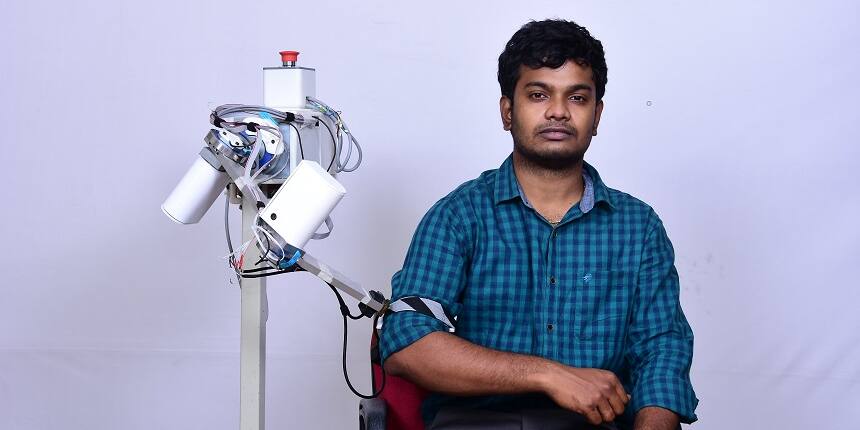IIT Madras, Portescap collaborate to create rehabilitation robot for people with arm impairments
Vagisha Kaushik | March 4, 2022 | 02:20 PM IST | 2 mins read
AREBO robot will train individual joint movements at shoulder, elbow for persons with stroke, arthritis, cerebral palsy, and Parkinson’s disease, etc.

NEW DELHI: The Indian Institute of Technology (IIT) Madras has collaborated with Motion Technology Firm Portescap to develop medical innovation using Robotics for rehabilitation. This CSR project also involves Christian Medical College (CMC) Vellore.
The project is facilitated by the Office of Institutional Advancement, IIT Madras and will focus on creating an innovative rehabilitation robot – AREBO (Arm Rehabilitation Robot) – for people with arm impairments.
Also Read | IIT Delhi, Log9 Materials tie up for research and development on battery, energy storage solutions
AREBO is a six-degrees-of-freedom robot for training individual joint movements at the shoulder and elbow for persons with neurological and musculoskeletal conditions such as stroke, arthritis, cerebral palsy, and Parkinson’s disease, etc. The design of this robot allows it to be easily connected to either the left or right arm of a user, and provides safe training of the arm.
The project is led by Professor Sujatha Srinivasan, Faculty Head, TTK Center for Rehabilitation Research and Device Development (R2D2) at IIT Madras, and Professor Sivakumar Balasubramanian, CMC Vellore.
IIT Madras, CMC Vellore project highlights
Highlighting the unique aspects of this collaboration, Srinivasan said, “The project leverages the strengths of R2D2 in developing and taking to market, functional and affordable devices for movement disability, while also drawing from the bioengineering and clinical expertise of CMC. Research and Development costs covered through CSR support are crucial to achieve the eventual goal of taking high-quality devices to the market at affordable prices.”
Also Read | IIT Roorkee confers HRED River Ganga Rejuvenation Award 2021 upon Rajiv Ranjan Mishra
Regarding the outcomes envisaged under this CSR Project, Balasubramanian said, “AREBO is the result of our approach towards simplifying rehabilitation robots, which is necessary for routine clinical use. We expect to have a simple, compact, easy-to-use, and safe robot ready for large-scale clinical trials through this collaboration. Bringing this device to the market will require understanding as to how this device fits into routine clinical practice and its added value to patients and clinicians.”
IIT Madras has also partnered with Institute of Neurosciences, Kolkata, to develop a lower limb exoskeleton for ‘Gait Training’ of stroke and spinal cord injury patients and the design is in progress. This project is being led by Professor Sourav Rakshit in the department of mechanical engineering at IIT Madras.
Follow us for the latest education news on colleges and universities, admission, courses, exams, research, education policies, study abroad and more..
To get in touch, write to us at news@careers360.com.